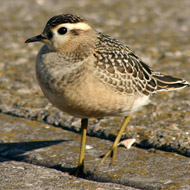
Climate change making rare birds more vulnerable
Climate change will have a ‘detrimental’ effect on bird species that are already in decline, according to new research.
The RSPB’s State of the UK’s Birds 2017 report found that projected changes in our climate could mean that the UK will become less suitable for scarce and rare breeding birds and make them at higher risk of extinction. These include dotterel, whimbrel, common scoter and Slavonian grebe.
But the report also found that climate change could provide opportunities for some species to increase and expand. Potential colonists include a number of wetlands species such as the night heron and little bittern.
The State of the UK’s Birds report has been giving an annual overview of bird populations in the UK since 1999. This year, the report focuses on how the impact climate change has, is having and is likely to have on bird populations in the future.
A key finding from this years’ report is that birds in the UK are showing changes in abundance and distribution. It found that they are currently moving northwards, in a way that is in line with climate change.
Furthermore, the report notes that migratory birds are arriving earlier and egg-laying dates have advanced. Swallows, for example, are arriving the UK 15 days earlier and breeding 11 days earlier than they did almost 60 years ago.
RSPB conservation scientist Dr Daniel Hayhow said that better protection and habitat provision will help facilitate movement of species under climate change. In a blog post, he writes:
‘The ability of a species to adapt to climate change will be influenced by other pressures in the environment and so it will be crucial to reduce non-climate related drivers and improving habitat quality and availability.
‘Protected areas are going to be a vital part of responding to climate change, enabling conservation management as a priority. Connectivity between protected areas by increasing habitat availability in the wider countryside will be an important factor in facilitating movement of species under climate change.’
He added that nature reserves and land managers across the UK are working to develop a range of actions to adapt to climate change. These include coastal realignments and increasing microclimatic diversity.
Image (C) Mark Jobling.



 The veterinary mental health charity Vetlife is inviting the veterinary community to join it for a sponsored cold-water dip.
The veterinary mental health charity Vetlife is inviting the veterinary community to join it for a sponsored cold-water dip.